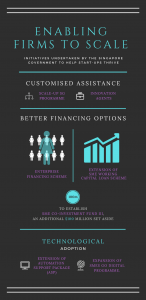Impact on Start-ups and SMEs
Budget 2019 is centered around the notion of building a sound micro-economic foundation to work hand-in-hand with a supportive macro-economic environment to establish a vibrant and innovative economy for the continual progress and success of our nation.
It highlights ways in which help will be given to support startups and SMEs and the structural reforms to be undertaken.
Finance Minister Mr Heng Swee Keat introduced 3 key thrusts to support industry transformation: building deep enterprise capabilities, building deep worker capabilities, and encouraging strong partnerships, within Singapore and across the world.
- Building Deep Enterprise Capabilities
The next step for start-ups to thrive is to scale up, venture into new markets and to so successfully, the government has identified 3 essential areas to provide support in.
The first area being, providing customised assistance. Enterprise Singapore will be launching a new structured growth partnership programme, Scale-up SG Programme, which will be implemented in collaboration with both the private and public sectors. The aim of this programme is to work with aspiring, high-growth local companies to identify and develop new capabilities, to innovate, grow, and internationalise. With up to 70% of the participation cost being funded by Enterprise Singapore. To aid innovation, a pilot Innovation Agents programme is to be launched to provide companies with an available pool of experts to consult on opportunities to innovate and commercialise technology.
The second area being, better financing options made available to start-ups and SMEs. The government has identified the importance of having smart, patient capital to draw investors. The Monetary Authority of Singapore (MAS), has simplified the regulations for venture capital managers, and launched a US$5 billion private markets programme in a bid to attract investments from global private equity players. In addition to the $400 million set aside for the Co-Investment Programme (CIP) to invest in our SMEs, another $100 million will be used to establish the SME Co-Investment Fund III. With regards to loan financing, an important source for SMEs, the Government will consolidate and streamline Enterprise Singapore financial schemes into one: Enterprise Financing Scheme (EFS). Eligible young companies can receive government risk sharing of up to 70% with participating financial institutions. Lastly, the SME Working Capital Loan scheme will be extended for 2 more years, uptil March 2021, and it will come under the EFS scheme.
The third area is the provision of support for technology adoption. The SMEs Go Digital programme is to be expanded to help SMEs with the required digital technology and skills training programmes. the Automation Support Package (ASP) will be extended by 2 years to incite more companies to automate their operations, raising productivity.
- Building deep worker capabilities
The Singapore government is a strong advocate of life-long learning and the continual attainment of skills, knowledge and experience. As such, Mr heng has announced various ways in which the Singaporeans can be enabled to do so.
Professional Conversion Programmes (PCPs) in sectors such as, blockchain, embedded software, and prefabrication, were introduced to allow our experienced professionals to continue building on their experience to branch out into new growth areas.
The Career Support Programme (providing employers with wage support to hire eligible Singaporeans who are mature and retrenched, or in extended periods of unemployment) will be extended for 2 more years.
Workforce quota will be amended. Dependency Ratio Ceiling (DRC) is to be reduced from 40% to 35%, as well as the service sector S Pass Sub-DRC from 15% to 10% within the coming 2 years.
To support the adjustments, the Enterprise Development Grant (70% funding support level) will be extended till 31 March 2023. The Productivity Solutions Grant will support up to70% of the training costs incurred. Additionally, the increase in Foreign Worker Levy rates for the Marine Shipyard and Process sectors is to be deferred until next year.
- Encouraging strong partnerships, within Singapore and across the world.
Local Enterprise and Association Development (LEAD) programme will work to further support the continuity of TACs success. Existing Free Trade Agreements (FTAs) will be digitised and streamlined for higher efficacy.
The Global Ready Talent Programme (for students currently in IHLs), local and overseas internship programmes combined into one, will be seeing greater funding. High-growth Singapore firms will also be enabled to send Singaporeans to prime markets such as Southeast Asia, China, and India.

